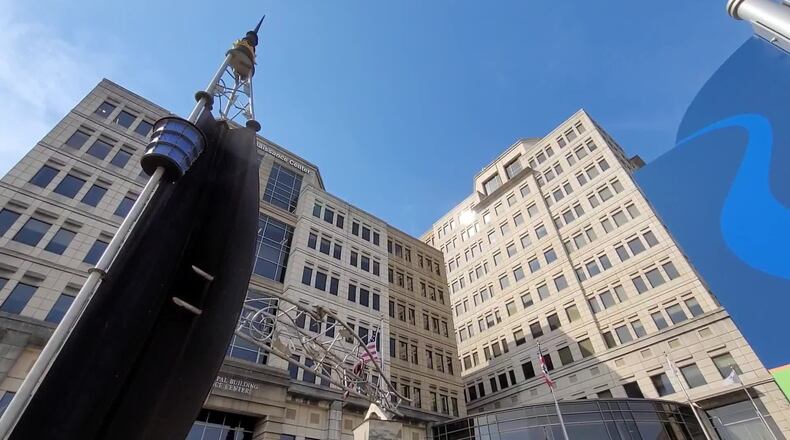“This is just a unique opportunity for Butler County,” Commissioner Cindy Carpenter said. “Something we’ve never had before and a great responsibility for the commissioners to decide what projects we will fund in their entirety or partially.”
The long-debated emergency mental health stabilization center is on the list with a potential capital investment of $1.5 to $5 million, depending on whether an existing building can be utilized or a new facility is required, according to Mental Health and Addiction Recovery Services Executive Director Scott Rasmus.
The project has actually been pitched twice, one of the county’s providers Sojourner CEO Scott Gehring also submitted a proposal, when asked he told the commissioners the capital cost could reach $5 to $7 million. He also told them he is not working against Rasmus, but with him, in a community input focus group Rasmus convened to fine-tune a request for proposals.
Commissioner Don Dixon told the Journal-News after the meeting there are many things to consider and costs could be pared if they are able to utilize the county-owned nursing home to some degree.
“Right now, it’s all on the table,” Dixon said.
The center would be an in-patient facility where police and potentially family members can bring people who are experiencing a psychotic incident or caused a drug-induced disturbance so police wouldn’t have to take them to jail.
The commissioners haven’t commented much on the presentations so far but appear to still favor this proposal. Commissioner T.C. Rogers said there isn’t anywhere to take people now and taking them to the jail isn’t optimal because “that’s not their bailiwick over there” and “as far as the cost, there is the actual cost and then part of that is the cost if you don’t do it.”
Carpenter said “in terms of a building, I want a Ford not a Cadillac; it just needs to get us there.”
The largest concrete request from this round of proposals came from Middletown at $6 million to help renovate or build a new Sonny Hill Community Center. City and school district officials came out in force to make the pitch, both entities have also pledged money to the estimated $12 million project.
City Manager Jim Palenick said the center, which has served youth and families for almost 100 years, “has been patched together and held together” but it is “reaching the end of its useful life.”
“We really wanted to put together a dramatic opportunity where partnerships could come together and create something quite transformational to our community...,” Palenick said. “That project ultimately will involve a multifunctional opportunity to serve youth literally from birth to 18 and the families that support that youth and all sorts of things in between.”
Dixon and Rogers questioned some of the construction cost assumptions and were told the numbers are very conservative estimates. Dixon said “we’d like to see more bang for the buck.” He told the Journal-News taxpayer-paid government buildings should not be opulent structures built with expensive materials.
Palenick assured them the 14-member committee they are convening will ensure “this doesn’t become some government-run thing, it’s about this community designing it’s own community center.”
The Great Miami Valley YMCA is looking for $1.9 million to renovate the Booker T. Washington Community Center in Hamilton. Woody Fitton, president and CEO, said much of the renovation, which includes resurfacing the gym floor and adding a boxing studio among other additions, is designed to engage disadvantaged youth.
“I don’t know whether you would see great importance to this, but if young people are in the center and they’re engaged in constructive programs like youth basketball they’re not on the streets at 14-years-old...,” Fitton said. “Each individual that we’re able to serve is potentially one less youth at serious risk of criminal activity or worse.”
There are two groups hoping to get funds to help the homeless, the city of Oxford, the Talawanda Oxford Pantry & Social Services and Family Resource Center are asking for $1.5 million to help them build a one-stop social services facility that includes services for the homeless.
Access Counseling is asking for as much as $900,000 — depending on partnership opportunities and available space — for engagement centers in Hamilton and Middletown to give the homeless access to much-needed services.
“Our engagement center is just that, it is not long-term housing, it is not residency, it is engagement,” Brandy Slaven with Access said. “It is an open door that someone can come in and meet a friendly face that says ‘I’m here to help you, we want to take you from the streets to placement’.”
The remainder of the presentations included a $1 million proposal by Supports to Encourage Low-income Families (SELF) to expand its program helping people learn how to repair their homes into the Lindenwald neighborhood in Hamilton; $500,000 to refurbish Primary Health Solutions’ dental van and $500,000 for the Shared Harvest Foodbank.
About the Author

